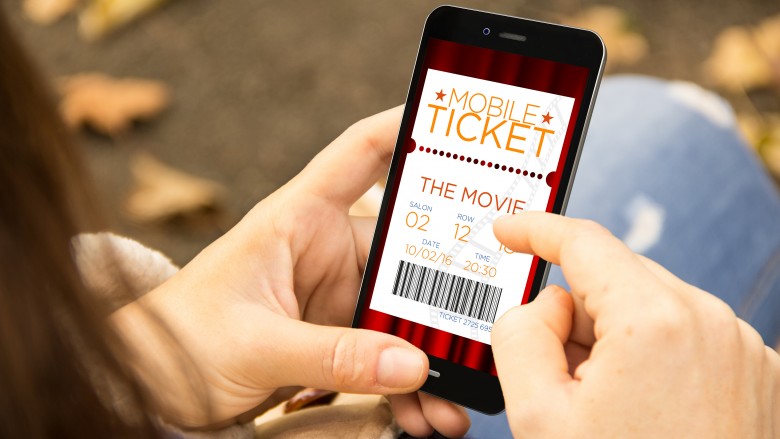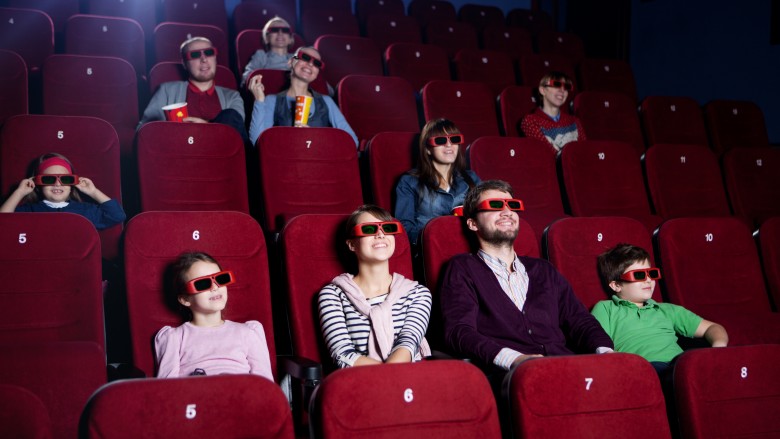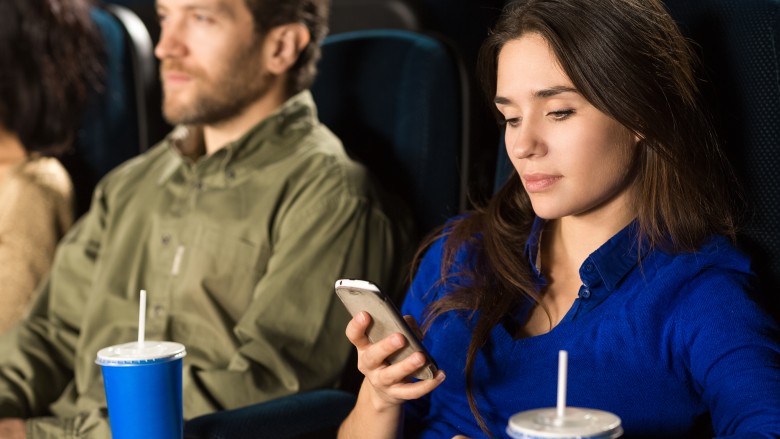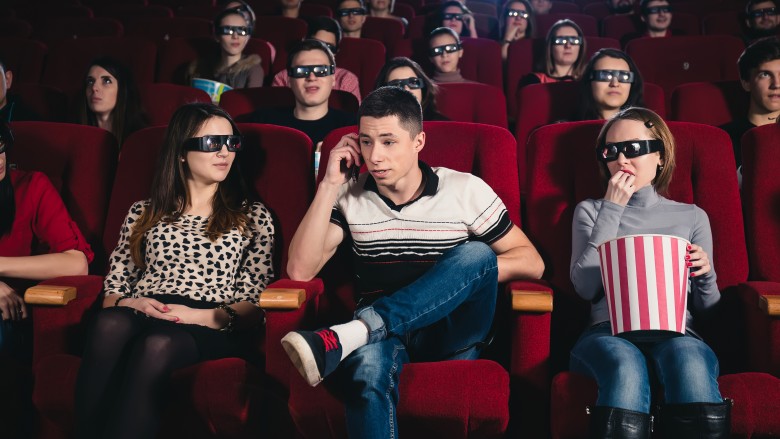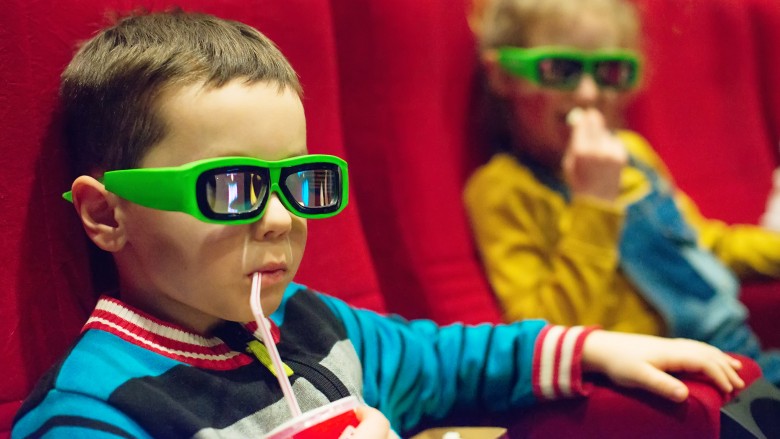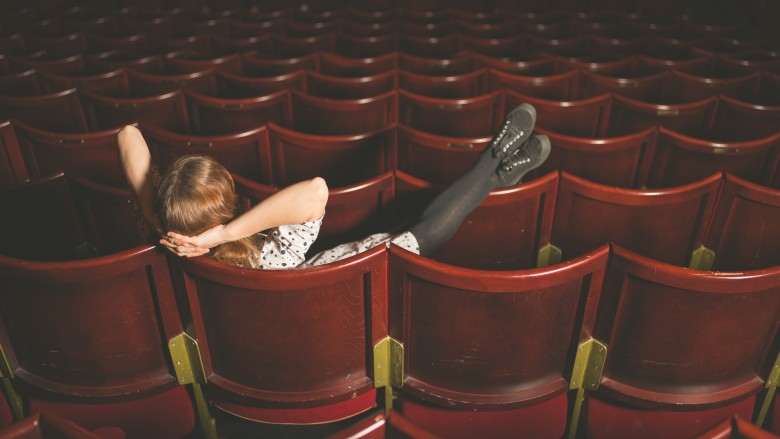Mistakes Everyone Makes When Going To The Movies
We all love going to the movies, but there seem to be endless ways to mar that trip to the theater. Perhaps the ticket and concession prices are too expensive, or there aren't enough seats for your friends and family to sit together. Or, more likely, there's a disruptive person in the audience that ruins the experience for everyone else. Movie theater etiquette goes unspoken, but there are things people mistakenly do without knowing what they're doing is disruptive. Furthermore, there are ways to save money (and time) by doing things slightly differently. Here are a few mistakes people make when going to the movies.
DO: Buy your tickets online (or at the self-pay machines)
There used to be a time when one had to look up the showtimes for movies in their local newspaper or go to the theater and look at the marquee. But nowadays, we usually check Fandango or another website for showtimes, then we go to the theater and purchase our tickets. But why not just do it online? It saves time spent waiting in line and, best of all, the tickets can be displayed right on your phone. Sure, paying a convenience fee is, well, inconvenient, but the trade-off—especially during peak times—is worth it. But if you're not okay with buying tickets online, why not just go to the self-pay machines adjacent to the ticket windows? If your theater has them, going that route is like going to the self-checkout at a grocery store if you only have a few things to purchase—easy, quick, and you typically don't have to wait in line.
DON'T: Put your stuff on the next seat
We've all done it, at airports, on public transportation, and in movie theaters. If no one's sitting there, and no one will sit there, then what's the harm in putting your stuff on an adjacent seat, right? Well, whoever walks by will automatically assume it's taken. It's the norm to believe that when someone places something on a seat, they're holding it—but that's not always the case, is it? So for the benefit of all moviegoers, please don't keep your stuff on the seat next to you...or at least wait until the movie starts to make sure no else is coming.
DO: Fill in all the seats
On that note, moviegoers should also try to fill in all the seats in their row. As humans, we like our personal space. We don't always want someone sitting next to us on a plane, on a bus, or in a movie theater. It can make us uncomfortable, which is why we tend to leave a seat open between us and the next guy. The thing is, when it comes to opening weekends (or worse, midnight shows), the theater can get pretty hectic. It's during these times that auditoriums sell out, and people in groups of two or more would like to sit together. Thus, if there's an open seat between you and someone else, be courteous and move over so another group can sit together and enjoy the movie too.
DON'T: Use your phone during the movie
Perhaps the most annoying thing someone can do during a movie is use their phone. Calling someone or answering a call isn't too common, but texting certainly is. People do it all the time, and it's disruptive for everyone. No matter how many times audiences are told not to use their phone, some people still do. In fact, it's gotten so bad that Apple is even considering putting a "Theater Mode" on iPhones—which is something many theater owners, including Alamo Drafthouse's Tim League, are vehemently against. Even AMC flirted with the idea of allowing texting during movies in order to appeal to millennial audiences. That didn't work out so well for them. If you need to answer a phone call or send a text message, go outside.
DO: Silence/turn off your phone
Sometimes it's not just about not using your phone, but rather about not silencing or turning it off. We get it—sometimes people forget to turn off their phones before the movie starts. But that's why there's at least one announcement/spot/splash page reminder for the audience before every screening. Sometimes theaters get creative with the announcements just to catch your attention. Still, no matter how many times theaters remind people, things happen; people forget—and when that ringer goes off during the movie, it's distracting for everyone.
DON'T: Talk during the movie
Long before people started using their phones during movies, they were merely talking. Talking is a normal part of life, but it's not something that should be done during a movie (at least in a movie theater). If you're at home, by all means, talk away. That's your prerogative. But movie theaters are a public space, and general audiences prefer to watch movies in silence so they won't miss anything. Talking is disruptive to everyone, especially those nearest the person talking. A movie theater isn't a space for analysis, discussion, or clarification—save all that stuff for the lobby, parking lot, and ride home.
DO: Control/watch over your children
When it comes to kids' movies, especially Disney, Pixar, and DreamWorks animated films, the theater can seem overrun by children—and that's totally fair. During those films, the auditoriums are the children's domain. But when it comes to other films, particularly PG-13 and R-rated movies, it's not only courteous but necessary for parents to watch over and maintain control of their children. It's rude to let children talk (loudly), play with their toys, and run down the aisles during a movie. People pay a small fortune to see movies in the theater, and it's unfair to those patrons if parents are unable to manage their children. Otherwise, the best option is to hire a babysitter.
DON'T: Make disruptive sounds
In addition to talking and texting on the phone, one of the most annoying things a person can do in a movie theater is make loud noises. It's not your fault if the movie theater's popcorn containers (or bags) are noisy, but opening candy boxes during quiet scenes in a movie or chewing loudly can be awfully upsetting to audiences, especially those potentially suffering from misophonia. Do your part—be thoughtful.
DO: Let the usher/employee know if there's a problem
If a situation arises, don't confront the person directly; instead, find an usher or other theater employee. We've heard about too many people being hurt or killed after getting into an argument with a disorderly audience member during a movie. It's the theater's job to handle the situation in a proper and official manner, so it's best to leave it in their capable hands. Also, if there's something wrong with the screen/sound, why ruin your moviegoing experience? Let the employees know so they can remedy the issue.
DO: Be kind and courteous to the employees
Customer service is a tough gig, and when something goes wrong with the projector or there's a rise in concession prices, it isn't necessarily the fault of the employee you happen to be speaking with. Most of them aren't making much above minimum wage, and they spend every holiday working, at least in the United States. (After all, Thanksgiving and Christmas are the busiest moviegoing days of the year.) If something goes wrong, remember the workers you're dealing with are just doing their jobs. Be kind and courteous to theater employees—and in fact, keep that in mind for any customer service representative you happen to encounter.
DON'T: Put your feet up on the seat in front of you
We all like to kick back when watching movies. When we find our seat and get situated, sometimes we'll sit criss-cross, put one leg over another, or put up our feet on the seat in front of us. While the former two are acceptable, it's not always respectable to do the latter. If there's no one sitting in front of you, it may be tempting to put your feet up on that seat—but what about those sitting around you? The people in that row may feel uncomfortable with someone's feet propped up next to them. Furthermore, it can be distracting for those sitting next to you.
DO: Throw away our trash on your way out
No one likes to clean up someone else's trash. And movie theater employees already have a lot to deal with on a day-to-day basis, especially during opening weekends for major movies. It's helpful to them if patrons throw away their trash on their way out of the theater. Usually, when someone's done with their popcorn or food, they put the box underneath their seat, so that it doesn't get in their way. But often, they'll forget to pick up the box on their way; sometimes, they'll even forget to take their drinks, their empty candy boxes, and anything else they brought. When movies are playing back-to-back all day long, and with several aisles and hundreds of seats to clean through, throwing away your trash can go a long way toward supporting your local theater's employees.
DON'T: Bring children to non-children movies
Most countries use movie rating agencies that assign ratings to films based on their content and how appropriate it might be for certain audiences. Each country has a slightly different system, but in the United States, the Motion Picture Association of America uses G, PG, PG-13, R, and NC-17. Filmgoers under 13 can't watch a PG-13 film without a legal guardian, and the same is true for those under 17 and R-rated movies.
Certain films, like Star Wars: The Force Awakens or The Avengers, might be okay for children with parents, but movies like Deadpool and Suicide Squad probably aren't, and bringing kids to inappropriate films isn't in their (or the audience's) best interest. According to Safety, bringing children to PG-13 and R-rated movies can be disruptive to the audience, if not boring or outright detrimental to the children. Plus, no one wants to hear a baby crying in a movie theater.
DO: Use movie apps
Nowadays, there really is an app for everything—and that some notion applies to the movie industry. Major chains like Regal and AMC have their own apps, but there are also up-and-coming services like Movie Pass and Atom Tickets that can benefit frequent filmgoers.
Movie Pass allows users who pay a monthly fee of approximately $50 to see one 2D movie every 24 hours. If you see more than three movies per month, that price is well worth it. The catch is, you can see each movie only once. For most movies, that's enough, but when it comes to blockbusters like Star Wars and superhero movies, fans want to see them multiple times. In that case, you'll have to purchase extra tickets separately.
Then there's Atom Tickets, which allows people who are watching movies in groups to purchase concession items in advance and pick them up at the side of the concession stand. Furthermore, the app enables people to organize a night out at the movies using their various services, including ticket-buying. The moviegoing experience is evolving, and apps are playing a major part in that evolution.

